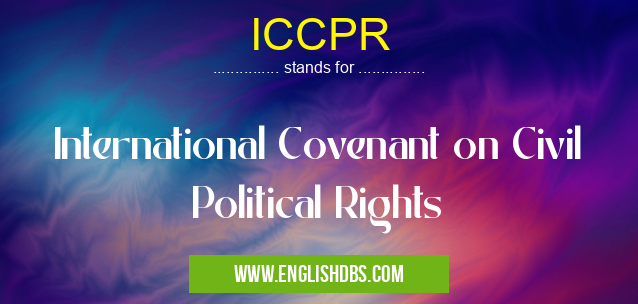What does ICCPR mean in INTERNATIONAL
The International Covenant on Civil and Political Rights (ICCPR) is a core human rights treaty adopted by the United Nations in 1966. It sets out a range of human rights for all people around the world, including freedom of expression, equality before the law, protection from discrimination, right to life, and more. The ICCPR is intended to protect fundamental human rights and freedoms for all individuals everywhere in the world.

ICCPR meaning in International in International
ICCPR mostly used in an acronym International in Category International that means International Covenant on Civil Political Rights
Shorthand: ICCPR,
Full Form: International Covenant on Civil Political Rights
For more information of "International Covenant on Civil Political Rights", see the section below.
Meaning
The ICCPR is an international agreement that outlines the civil and political rights of individuals across the globe. These include such fundamental freedoms as freedom from slavery and servitude, freedom of opinion and expression, equality before the law, protection from arbitrary arrest or detention, the right to a fair trial, privacy rights, and more. The purpose of this treaty is to ensure that these rights are respected globally—regardless of race, gender, nationality or other factors.
Full Form
The full form of ICCPR stands for International Covenant on Civil and Political Rights. This treaty was adopted in 1966 by the United Nations General Assembly and has since been ratified by 164 countries around the world. By ratifying this agreement, countries are legally bound to respect their citizens' civil and political rights as outlined in its text.
Essential Questions and Answers on International Covenant on Civil Political Rights in "INTERNATIONAL»INTERNATIONAL"
What is the International Covenant on Civil Political Rights?
The International Covenant on Civil and Political Rights (ICCPR) is a multilateral treaty adopted by the United Nations General Assembly on 16 December 1966. It affords a wide range of fundamental political, civil, economic, social and cultural rights to all individuals, as well as freedoms of religion and thought.
When did the ICCPR enter into effect?
The ICCPR entered into force on 23 March 1976.
Who is responsible for monitoring compliance with the ICCPR?
The Human Rights Committee is responsible for monitoring compliance with the ICCPR. It comprises 18 independent experts who are elected by States parties to a four-year term.
What are some examples of rights protected by the ICCPR?
The Convention protects a wide range of civil and political rights, including but not limited to right to life; freedom of movement within and outside one’s country; freedom from torture, slavery or cruel, inhuman or degrading treatment or punishment; equal protection before law without discrimination; freedom from arbitrary arrest and/or detention; right to fair trial; right to privacy; freedom of conscience and religion; right to assembly and association.
Are there any punishments for violating the rights outlined in the ICCPR?
No, there are no punishments for violating the rights outlined in ICCPR. However, states that have ratified it are obligated under international law to abide by its provisions and failure to do so can lead to other forms of accountability such as censure or condemnation from other countries or international organisations like UN Human Rights Council.
Final Words:
The International Covenant on Civil and Political Rights (ICCPR) is an important document that serves to protect fundamental human rights worldwide. By ratifying this treaty, countries are held accountable for upholding their citizens’ civil liberties according to internationally accepted standards laid out in this agreement. The ICCPR stands as an example of how nations can work together towards a shared goal of promoting universal respect for individuals’ basic human rights regardless of race or nation.
